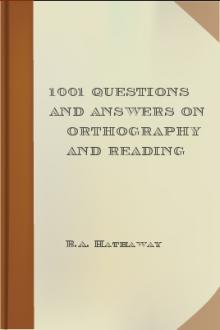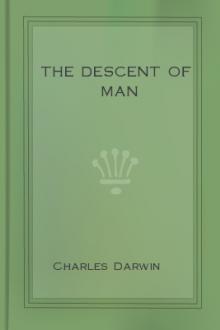The Shadow On The Dial, and Other Essays - Ambrose Bierce (latest ebook reader .TXT) 📗

- Author: Ambrose Bierce
Book online «The Shadow On The Dial, and Other Essays - Ambrose Bierce (latest ebook reader .TXT) 📗». Author Ambrose Bierce
But the advocates of agreeable pains and penalties tell us that in the darker ages, when cruel and degrading punishment was the rule, and was freely inflicted for every light infraction of the law, crime was more common than it is now; and in this they appear to be right. But they one and all overlook a fact equally obvious and vastly significant: that the intellectual, moral and social condition of the masses was very low. Crime was more common because ignorance was more common, poverty was more common, sins of authority, and therefore hatred of authority, were more common. The world of even a century ago was a quite different world from the world of today, and a vastly more uncomfortable one. The popular adage to the contrary notwithstanding, human nature was not by a long cut the same then that it is now. In the very ancient time of that early English king, George III, when women were burned at the stake in public for various offenses and men were hanged for "coining" and children for theft, and in the still remoter period, (circa 1530) when poisoners were boiled in several waters, divers sorts of criminals were disemboweled and some are thought to have undergone _the pene forte et dure_ of cold-pressing (an infliction which the pen of Hugo has since made popular--in literature)--in these wicked old days it is possible that crime flourished, not because of the law's severity, but in spite of it. It is possible that our respected and respectable ancestors understood the situation as it then was a trifle better than we can understand it on the hither side of this gulf of years, and that they were not the reasonless barbarians that we think them to have been. And if they were, what must have been the unreason and barbarity of the criminal element with which they had to deal?
I am far from thinking that severity of punishment can have the same restraining effect as probability of some punishment being inflicted; but if mildness of penalty is to be superadded to difficulty of conviction, and both are to be mounted upon laxity in detection, the "pile" will be "complete" with a vengeance. There is a peculiar fitness, perhaps, in the fact that all these ideas for comfortable punishment should be urged at a time when there appears to be a tolerably general disposition to inflict no punishment at all. There are, however, still a few old-fashioned persons who hold it obvious that one who is ambitious to break the laws of his country will not with as light a heart and as airy an indifference incur the peril of a harsh penalty as he will the chance of one more nearly resembling that which he would select for himself.
III.
After lying for more than a century dead I was revived, given a new body, and restored to society. This was in the year 2015. The first thing of interest that I observed was an enormous building, covering a square mile of ground. It was surrounded on all sides by a high, strong wall of hewn stone upon which armed sentinels paced to and fro. In one face of the wall was a single gate of massive iron, strongly guarded. While admiring the cyclopean architecture of the "reverend pile" I was accosted by a man in uniform, evidently The Warden, with a cheerful salutation.
"Colonel," I said, pressing his hand, "it gives me pleasure to find some one that I can believe. Pray tell me what is this building."
"That," said the colonel, "is the new State penitentiary. It is one of twelve, all alike."
"You surprise me," I replied. "Surely the criminal element must have increased enormously."
"Yes, indeed," he assented; "under the Reform _regime_, which began in your day, it became so powerful, bold and fierce that arrests were no longer possible and the prisons then in existence were soon overcrowded. The State was compelled to erect others of greater capacity."
"But, Colonel," I protested, "if the criminals were too bold and powerful to be taken into custody, of what use are the prisons! And how are they crowded?"
He fixed upon me a look that I could not fail to interpret as expressing a doubt of my sanity. "What?" he said, "is it possible that the modern Penology is unknown to you? Do you suppose we practise the antiquated and ineffective method of shutting up the rascals? Sir, the growth of the criminal element has, as I said, compelled the erection of more and larger prisons. We have enough to hold comfortably all the honest men and women of the State. Within these protecting walls they carry on all the necessary vocations of life excepting commerce. That is necessarily in the hands of the rogues as before."
"Venerated representative of Reform," I exclaimed, wringing his hand with effusion, "you are Knowledge, you are History, you are the Higher Education! We must talk further. Come, let us enter this benign edifice; you shall show me your dominion and instruct me in the rules. You shall propose me as an inmate."
I walked rapidly to the gate. When challenged by the sentinel, I turned to summon my instructor. He was nowhere visible: desolate and forbidding, as about the broken statue of Ozymandias,
"The lone and level sands stretched far away."
RELIGION
I.
This is my ultimate and determining test of right--"What, in the circumstances, would Christ have done?"--the Christ of the New Testament, not the Christ of the commentators, theologians, priests and parsons. The test is perhaps not infallible, but it is exceedingly simple and gives as good practical results as any. I am not a Christian, but so far as I know, the best and truest and sweetest character in literature, is next to Buddha, Jesus Christ. He taught nothing new in goodness, for all goodness was ages old before he came; but with an almost infallible intuition he applied to life and conduct the entire law of righteousness. He was a lightning moral calculator: to his luminous intelligence the statement of the problem carried the solution--he could not hesitate, he seldom erred. That upon his deeds and words was founded a religion which in a debased form persists and even spreads to this day is mere attestation of his marvelous gift: adoration is a primitive mode of recognition.
It seems a pity that this wonderful man had not a longer life under more complex conditions--conditions more nearly identical with those of the modern world and the future. One would like to be able to see, through the eyes of his biographers, his genius applied to more and more difficult questions. Yet one can hardly go wrong in inference of his thought and act. In many of the complexities and entanglements of modern affairs it is no easy matter to find an answer off-hand to the question,"What is it right to do?" But put it in another way: "What would Christ have done?" and lo! there is light. I Doubt spreads her bat-like wings and is away; the sun of truth springs into the sky, splendoring the path of right and marking that of error with a deeper shade.
II.
Gentlemen of the secular press dealt with the Rev. Mr. Sheldon not altogether fairly. To some very relevant considerations they gave no weight. It was not fair, for example, to say, as the distinguished editor of the "North American Review" did, that in professing to conduct a daily newspaper for a week as he conceived that Christ would have conducted it, Mr. Sheldon acted the part of "a notoriety seeking mountebank." It seldom is fair to go into the question of motive, for that is something upon which one has the least light, even when the motive is one's own. The motives that we think dominale us seem simple and obvious; they are in most instances exceedingly complex and obscure. Complacently surveying the wreck and ruin that he has wrought, even that great anarch, the "well meaning person," can not have entire assurance that he meant as well as the disastrous results appear to him to show.
The trouble with Mr. Harvey of the "Review" was inability to put himself in another's place if that happened to be at any considerable distance from his own place. He made no allowance for the difference in the point of view--for the difference, that is, between his mind and the mind of Mr. Sheldon. If Mr. Harvey had undertaken to conduct that Kansas newspaper as Christ would have done he would indeed have been "a notoriety seeking mountebank," or some similarly unenviable thing, for only a selfish purpose could persuade him to an obviously resultless work. But Mr. Sheldon was different--his was the religious mind--a mind having faith in an "overruling" Providence who can, and frequently does, interfere with the orderly relation of cause and effect, accomplishing an end by means otherwise inadequate to its production. Believing himself a faithful servant of that Power, and asking daily for its interposition for promotion of a highly moral purpose, why should he not have expected his favor to the enterprise? To expect that was, in Mr. Sheldon, natural, reasonable, wise; his folly lay in believing in conditions making it expectable. A person convinced that the law of gravitation is suspended is no fool for walking into a bog. Mr. Harvey may understand, but Mr. Sheldon can not understand, that Jesus Christ would not edit a newspaper at all.
The religious mind, it should be understood, is not logical. It may acquire, as Whateley's did, a certain familiarity with the syllogism as an abstraction, but of the syllogism's practical application, its real relation to the phenomena of thought, the religious mind can know nothing. That is merely to say that the mind congenitally gifted with the power of logic and accessible to its light and leading does not take to religion, which is a matter, not of reason, but of feeling--not of the head, but of the heart. Religions are conclusions for which the facts of nature supply no major premises. They are accepted or rejected according to the original mental make-up of the person to whom they appeal for recognition. Believers and unbelievers are like two boys quarreling across a wall. Each got to his place by means of a ladder. They may fight if they will, but neither can kick away the other's support.
Believing the things that he did believe, Mr. Sheldon was entirely right in thinking that the main purpose of a newspaper should be the salvation of souls. If his religious belief is true that should be the main purpose, not only of a newspaper, but of everything that has a purpose, or can be given one. If we have immortal souls and the consequences of our deeds in the body reach over into another life in another world, determining there our eternal state of happiness or pain, that is the most momentous fact conceivable. It is the only momentous fact; all others are chaff and rags. A man who, believing it to be a fact, does not make it the





Comments (0)